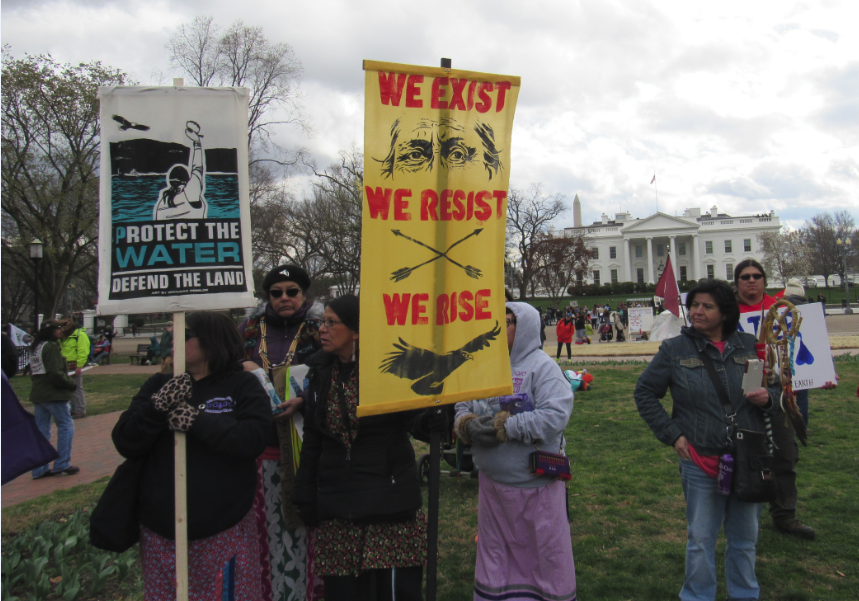
- Details
- By Monica Whitepigeon
WASHINGTON, D.C. — Support continues to grow for the shutdown of the Dakota Access Pipeline, as celebrities and activists bring awareness to the ongoing tribal and environmental dispute.
On Jan. 26, the U.S. Court of Appeals for the D.C. Circuit ruled in favor of the Standing Rock Sioux Tribe that the U.S. Army Corps violated environmental laws and is required to perform an environmental impact statement (EIS). The EIS will examine oil spill risks and determine alternative routes to avoid hazards to the tribe.
The pipeline had been operating without a permit and the Corps took no action to correct this under the Trump administration. While the EIS proceeds, the current Biden administration has discretion to issue an interim shutdown order, which will bring the pipeline into federal compliance.
Organizers and other activists are joining together to push the new administration to go even further. Earlier this month, Standing Rock and Cheyenne River youth organized a 93-mile run to urge President Joe Biden to end the pipeline.
Long-time NoDAPL supporter and actor Mark Ruffalo posted a solidarity video of himself running and said, “Hey @POTUS @JoeBiden, the Dakota Access Pipeline continues to operate illegally endangering the Standing Rock Sioux Tribe. I am joining Lakota youth’s #NODAPL challenge to demand you #shutdownDAPL. #ByeDenDAPL.”
On Feb. 8, Ruffalo and other high-profile celebrities released a letter encouraging the president and the vice president to take action.
An excerpt from the letter read: “We urge you to remedy this historic injustice and direct the U.S. Army Corps of Engineers to immediately shut down the illegal Dakota Access Pipeline while the Environmental Impact Statement process is conducted, consistent with the D.C. District Court’s decision and order. Additionally, the U.S. Army Corps must ensure a robust environmental review with significant tribal consultation, tribal consent, and a thorough risk analysis. With your leadership, we have a momentous opportunity to protect our water and respect our environmental laws and the rights of Indigenous people.”
Signatories ranged from celebrities to Native organizations to eco-conscious companies, including Ava DuVernay, Scarlett Johansson, Taboo Nawasha, Tom Goldtooth, Crystal Echo Hawk, Jeremy Nicholds, and Kate Ogden.
Reuters recently reported that two Army Corps attorneys, Jeffrey Clark Sr. and Eric Allen Grant, are withdrawing from the DAPL case. Clark oversaw the DOJ’s environment and natural resources division and is currently being investigated for alleged involvement in altering the election results.
In another letter to President Biden, tribal officials and other Native organizations insisted on the immediate halt to construction.
“The federal government’s continued failure to halt the operation of DAPL represents a violation of its legal obligations to Tribal Nations including its treaty obligations, its fiduciary duty to protect the health and welfare of Indian Tribes, and its obligations to take seriously Tribal input in matters affecting Tribal Nations, their people, and their lands. As D.C. Circuit stated in its opinion, ‘The Tribes’ unique role and their government-to-government relationship with the United States demand that their criticisms be treated with appropriate solicitude,’” the letter read in a Standing Rock Facebook post.
“Not only is this an opportunity for your administration to correct the Corps errant course, but it is also an opportunity to demonstrate to tribes across the United States that this administration will take Tribal rights seriously and honor its fiduciary responsibility.”
More Stories Like This
Native News Weekly (August 25, 2024): D.C. BriefsZuni Youth Enrichment Project Announces Family Engagement Night and Spring Break Youth Programming
Next on Native Bidaské: Leonard Peltier Reflects on His First Year After Prison
Deb Haaland Rolls Out Affordability Agenda in Albuquerque
Boys & Girls Clubs and BIE MOU Signing at National Days of Advocacy
Help us defend tribal sovereignty.
At Native News Online, our mission is rooted in telling the stories that strengthen sovereignty and uplift Indigenous voices — not just at year’s end, but every single day.
Because of your generosity last year, we were able to keep our reporters on the ground in tribal communities, at national gatherings and in the halls of Congress — covering the issues that matter most to Indian Country: sovereignty, culture, education, health and economic opportunity.
That support sustained us through a tough year in 2025. Now, as we look to the year ahead, we need your help right now to ensure warrior journalism remains strong — reporting that defends tribal sovereignty, amplifies Native truth, and holds power accountable.
 The stakes couldn't be higher. Your support keeps Native voices heard, Native stories told and Native sovereignty defended.
The stakes couldn't be higher. Your support keeps Native voices heard, Native stories told and Native sovereignty defended.
Stand with Warrior Journalism today.
Levi Rickert (Potawatomi), Editor & Publisher

